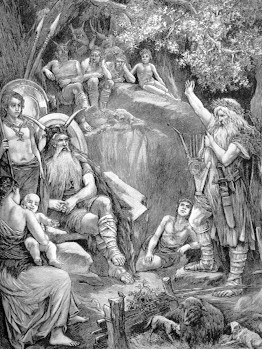Praising the Famous
Today, thoughts on fame and fortune. The University of Houston's College of Engineering presents this series about the machines that make our civilization run, and the people whose ingenuity created them.
Throughout this series we've talked about the error of assigning priority. Credit Bell with inventing the telephone, and we overlook all the inventors he built upon: Bourseul, Reis, Gray -- all names we've largely forgotten. Great inventions are always the gift of many people, not just one. Perhaps we write about science and technology the way we do because we so want to tap into the old hero mythologies. A wonderful passage in the Book of Ecclesiasticus casts some light on this. It begins,
Let us now praise famous men, ...
Such as did bear rule in their kingdoms,
Men renowned for their power, ...
Such as found out musical tunes,
And recited verses in writing:
All these were honoured in their generations,...
But then that same passage moves on to a far more realistic, and even poignant, understanding of invention. It goes on to say,
And some there be, which have no memorial;
Who are perished as though they had never been.
Their bodies are buried in peace;
But their name lives for evermore. ...
The people shall tell of their wisdom.
We can't study the history of technology long before we find ourselves haunted by countless people with no memorial who do, nevertheless, live forever -- anonymous inventors of the wheel, the windmill, the plow.
The simple fact is, you and I create our own memorials. If wealth is my objective, then wealth is my memorial. If fame is my objective, fame may well be all I get. But look around at the memorials of anonymous technologies that made a better world -- leaps of the mind that made the differential gear, the pencil sharpener, the electric plug, the drop-leaf table, the lawn sprinkler.
If we tried to determine who invented each of these things, we'd find the same confusion of precursor contributions. Yet these anonymous and infinitely helpful devices make finer memorials for the many quixotic, mentally-driven people who gave them to us than wealth or tombstones ever could.
The great engineering educator Llewelyn Boelter would tell his new students, "The products of your minds are the most precious things that you own ... you must do the right thing with them."
If anything lives forever, it is those products of our minds, with or without any memorial. They are the most precious things we own. More than that, they are the most glorious things we have to give away.
Take the time to trace any major invention back until it gradually fades into anonymity. In the end, you'll always find yourself telling of the wisdom of people whose "bodies are buried in peace" and who "have no memorial" -- steamboat inventors before Fulton, light-bulb inventors before Edison -- mousetrap inventors before even you or me.
I'm John Lienhard, at the University of Houston, where we're interested in the way inventive minds work.
(Theme music)
Anonymous, The Book of Ecclesiasticus. Chapter 44, Verse 1. This is a part of the Apocrypha in the King James Bible. The Catholic Vulgate Bible assigns it the somewhat higher status of a deuterocanonical book.
This is a greatly revised version of Episode 70.
